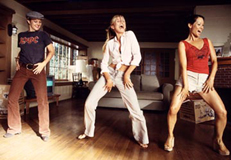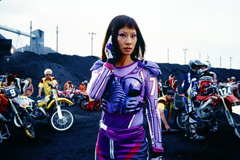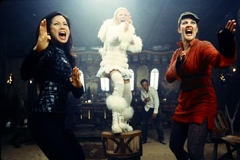Charlie’s Angels: Full Throttle (McG, 2003)
 After three viewings of the hyperactive Charlie’s Angels: Full Throttle, I’m not quite certain that I
have a firm grip on what it is precisely that makes it exert such a firm (but
enjoyable) grip on me, but that hardly impedes the amount of fun that I have
while watching it. On my first viewing, I mostly enjoyed the endless procession
of set pieces and costume changes, and rode along on the brainless, feel-good
vibe. I don't usually get caught up in this mode of frenzied, shallow
filmmaking, but something about Throttle’s
total lack of pretense made it easy for me to give in, even though I
disliked the first Angels movie. It’s almost identical to its high-concept
predecessor in mode of attack, but I think the sequel is simply more consistent
at delivering more inspired set pieces and more amusing, absurdist situations
than its predecessor, a film that I found myself admiring more in concept than
execution.
After three viewings of the hyperactive Charlie’s Angels: Full Throttle, I’m not quite certain that I
have a firm grip on what it is precisely that makes it exert such a firm (but
enjoyable) grip on me, but that hardly impedes the amount of fun that I have
while watching it. On my first viewing, I mostly enjoyed the endless procession
of set pieces and costume changes, and rode along on the brainless, feel-good
vibe. I don't usually get caught up in this mode of frenzied, shallow
filmmaking, but something about Throttle’s
total lack of pretense made it easy for me to give in, even though I
disliked the first Angels movie. It’s almost identical to its high-concept
predecessor in mode of attack, but I think the sequel is simply more consistent
at delivering more inspired set pieces and more amusing, absurdist situations
than its predecessor, a film that I found myself admiring more in concept than
execution.
 The second time through I tried, mostly without success, to examine the style and what it was saying. The closest I got was to note
that there’s a vibe running throughout that seems to comment upon our
collective need for instant gratification. There's a tendency to resolve any
suspense in a matter of quick shots instead of a matter of scenes. The Angels
have zero reaction time to any situation that arises and seem totally adept in
navigating whichever pop-culture fantasia that the movie is taking place in at a
given moment. Whenever they aren't spurting catch phrases or spouting PG-13
acceptable innuendo, they are making pop culture references, in a
way, the message here is that they are empowered because of their pop-culture awareness. When the movie asks us to recall as
many outside sources as it does, it’s attempting to gratify us by showing us
that we’re, at least on some level, able to keep up with the superhuman
Angels. The endless references to songs, styles of clothing, and modes of
filmmaking serve as emotional shorthand, giving the audience members something
to identify with. In most films, those references are slotted into a context
that makes them relevant to the characters and situations in the film we're
watching and any outside association on the audience’s part is a bit
superfluous. In Full Throttle, these
references themselves might become the text by virtue of being the most
substantive element present. Even then, because they are so tenuously tied
together, the best that can be said is that they might only be present to serve
the audience's expectation of fun (which worked for me, since I do indeed find
it fun...). Full Throttle’s only
demand upon the audience is a firm awareness of pop culture. To anyone that
possesses that, it offers a parade of endless and easy gratification.
The second time through I tried, mostly without success, to examine the style and what it was saying. The closest I got was to note
that there’s a vibe running throughout that seems to comment upon our
collective need for instant gratification. There's a tendency to resolve any
suspense in a matter of quick shots instead of a matter of scenes. The Angels
have zero reaction time to any situation that arises and seem totally adept in
navigating whichever pop-culture fantasia that the movie is taking place in at a
given moment. Whenever they aren't spurting catch phrases or spouting PG-13
acceptable innuendo, they are making pop culture references, in a
way, the message here is that they are empowered because of their pop-culture awareness. When the movie asks us to recall as
many outside sources as it does, it’s attempting to gratify us by showing us
that we’re, at least on some level, able to keep up with the superhuman
Angels. The endless references to songs, styles of clothing, and modes of
filmmaking serve as emotional shorthand, giving the audience members something
to identify with. In most films, those references are slotted into a context
that makes them relevant to the characters and situations in the film we're
watching and any outside association on the audience’s part is a bit
superfluous. In Full Throttle, these
references themselves might become the text by virtue of being the most
substantive element present. Even then, because they are so tenuously tied
together, the best that can be said is that they might only be present to serve
the audience's expectation of fun (which worked for me, since I do indeed find
it fun...). Full Throttle’s only
demand upon the audience is a firm awareness of pop culture. To anyone that
possesses that, it offers a parade of endless and easy gratification.
 Every Hollywood blockbuster operates by these rules to some
extent, but few, if any push this style to this extreme. Has any movie ever
relied more on the hope that the audience was completely keyed into its sense of
fun? Has any movie ever so completely disregarded believability? Has any movie
ever had more pop-culture references? If you strip them away, the flashy style
is all that's left, so it becomes the movie's meaning. That this movie exists at
all is its social commentary. I honestly have no idea how much of the satire is
intentional, but there seems to me a clear vibe running throughout that mocks
the very notion of the Hollywood blockbuster. Matt LeBlanc plays an obvious Tom
Cruise caricature (I love his Maximum
Extreme hand gestures). Demi Moore is treated like a demi-god, probably
because she was the first woman to earn an 8 figure salary for a movie. It goes
further than that, though. Much of the film's instant gratification,
stimulus/response shell game comes with caveats. The "look but don't
touch" striptease scenes are the most obvious examples, since they reduce
the T&A to PG-13 levels, denying the audience what they want to see most (or
have we been trained to want the innuendo and not the nudity?). Crispin Glover's
Thin Man character's hair-smelling obsession seems to be a critique of that sort
of reckless self-entitlement because he acts to get an immediate sense of
fulfillment without weighing the results. Paradoxically though, he gets the
girl, and the girls always come out on top, so maybe it's not criticizing
anything, and maybe it's just hyper-aware of the way that things tend to work in
these movies. Maybe we're all turning into the group of impatient, screaming
kids that the film focuses on as they wait to cross the street. Pop culture
becomes the great equalizer when it reduces us all to an infantile state. The
fortunate side effect of Full Throttle's
schizophrenic approach is that any disappointment with a scene is fleeting since
another, wildly different one will be along in seconds. In any case, I was too
intrigued and too entertained by what I saw in Full Throttle to write it off, much less consider it The Death of
Cinema. As I wrote earlier, I can't think of a single movie that pushes this
mode of filmmaking farther, for better or worse. If nothing else, it's a
startling/shining example of Hollywood's ability to absorb everything, including
anti-Hollywood sentiment, and regurgitate it as something sexier, flashier, more
fun, and less filling.
Every Hollywood blockbuster operates by these rules to some
extent, but few, if any push this style to this extreme. Has any movie ever
relied more on the hope that the audience was completely keyed into its sense of
fun? Has any movie ever so completely disregarded believability? Has any movie
ever had more pop-culture references? If you strip them away, the flashy style
is all that's left, so it becomes the movie's meaning. That this movie exists at
all is its social commentary. I honestly have no idea how much of the satire is
intentional, but there seems to me a clear vibe running throughout that mocks
the very notion of the Hollywood blockbuster. Matt LeBlanc plays an obvious Tom
Cruise caricature (I love his Maximum
Extreme hand gestures). Demi Moore is treated like a demi-god, probably
because she was the first woman to earn an 8 figure salary for a movie. It goes
further than that, though. Much of the film's instant gratification,
stimulus/response shell game comes with caveats. The "look but don't
touch" striptease scenes are the most obvious examples, since they reduce
the T&A to PG-13 levels, denying the audience what they want to see most (or
have we been trained to want the innuendo and not the nudity?). Crispin Glover's
Thin Man character's hair-smelling obsession seems to be a critique of that sort
of reckless self-entitlement because he acts to get an immediate sense of
fulfillment without weighing the results. Paradoxically though, he gets the
girl, and the girls always come out on top, so maybe it's not criticizing
anything, and maybe it's just hyper-aware of the way that things tend to work in
these movies. Maybe we're all turning into the group of impatient, screaming
kids that the film focuses on as they wait to cross the street. Pop culture
becomes the great equalizer when it reduces us all to an infantile state. The
fortunate side effect of Full Throttle's
schizophrenic approach is that any disappointment with a scene is fleeting since
another, wildly different one will be along in seconds. In any case, I was too
intrigued and too entertained by what I saw in Full Throttle to write it off, much less consider it The Death of
Cinema. As I wrote earlier, I can't think of a single movie that pushes this
mode of filmmaking farther, for better or worse. If nothing else, it's a
startling/shining example of Hollywood's ability to absorb everything, including
anti-Hollywood sentiment, and regurgitate it as something sexier, flashier, more
fun, and less filling.
75
07-11-03
Jeremy Heilman